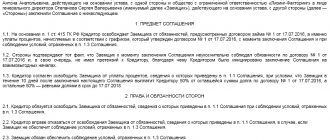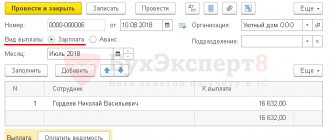Regulations on cash payments
Uniform requirements for cash payments are established by Bank of Russia Directive No. 5348-U dated December 9, 2019 (registered with the Russian Ministry of Justice No. 57999 on April 7, 2020).
The standard provides for a number of restrictions and conditions that must be met in order to spend cash at the organization's cash desk - its norms determine the maximum amount of cash payments between legal entities and individual entrepreneurs. The key requirement relates to the expenditure of proceeds received as payment for products sold, work performed and services rendered. In 2022, it is prohibited to spend cash proceeds for any purpose, except for the following:
- wages and social benefits to employees;
- personal needs of a businessman (IP);
- payment for goods, works, services, except for securities;
- refund of payment for goods, work, services;
- the issuance of money will be accountable;
- operations of bank payment agents, subagents;
- insurance compensation under insurance contracts with individuals.
For example, in order to issue a loan to a third party, you will first have to hand over the cash proceeds to the bank. Then submit an application to the bank to receive cash. Capitalize the money in the cash register, and only then transfer the funds as a loan to a third party.
Penalties for violations
Any deviations from the letter of the law are punishable by Article 15.1 of the Code of Administrative Offenses of the Russian Federation. It clearly states the fines that officials and legal entities face in case of violation of cash handling procedures.
So for officials the fine will be from 4,000 to 5,000 rubles, for legal entities - 10 times more: from 40,000 to 50,000. The information is relevant for 2022.
Important! Violation of cash discipline also entails the imposition of penalties.
These are the basic principles of cash circulation for individual entrepreneurs. Understanding these basics and knowledge of the legislative framework will help individual entrepreneurs conduct business successfully and legally.
Limit for 2022
The legislation sets a limit on cash transactions only in relation to organizations. For example, payment of services in cash by a legal entity to an individual is not limited to a maximum limit. But we are talking about ordinary citizens who are not registered as entrepreneurs with the Federal Tax Service. If payment is made between companies, firms or registered entrepreneurs, then the limit established in clauses 2, 6 of Bank of Russia Instructions No. 5348-U applies, as for settlements between legal entities.
The current limit for cash payments under one agreement between legal entities is 100,000 rubles under one agreement, regardless of whether the company receives the payment or makes it. The following conditions do not matter:
| Condition | A comment |
| Type and subject of the agreement | The limit of 100,000 applies to all cash payments, regardless of the subject of the contract. For example, a company does not have the right to issue a cash loan under one agreement for more than 100,000 rubles. It is also impossible to pay for goods, work, or services under one contract in an amount exceeding the current limit of 100,000 rubles. |
| Contract term, frequency and number of payments | It is prohibited to pay for a contract in cash, even if the amount is divided into several tranches, for a long time and if one payment does not exceed the permissible limit for settlements between legal entities in cash. For example, a company entered into an agreement for the supply of products worth 500,000 rubles. You cannot split the payment into 10 parts of 50,000 each and pay the amount in cash. It has been established what the maximum amount in cash an institution has the right to pay to a counterparty organization under a supply agreement is 100,000 rubles, the rest is transferred by bank transfer (by payment order). It is not prohibited to make multiple cash payments on the same day if payment is made under different agreements. Let's say a company pays for services under three different contracts. The limit is calculated for each contract - 100,000 rubles. |
| Type of obligations | We are talking about penalties, fines and other sanctions that are provided for by the terms of the contract. You cannot pay penalties in cash if the contract limit of 100,000 rubles has already been exhausted. |
| Type of contract execution | There are several ways to complete a transaction. For example, by drawing up a single document, exchanging forms, an offer agreement, etc. The limit of 100,000 applies to all types of transactions between individual entrepreneurs and legal entities and making payments between companies in cash. It is prohibited to pay an invoice whose amount exceeds RUB 100,000. |
| Calculation method | These payments between organizations for cash are carried out in two ways:
The current limit on cash payments between an LLC and an individual entrepreneur under one agreement applies regardless of the chosen method. Please note that the restriction does not apply to the payment of travel expenses to an accountable person. |
Which participants are subject to the limit?
The maximum limit for cash payments applies to the following economic entities:
- transactions between legal entities. For example, these are settlements between organizations, when one legal entity pays or receives money from another legal entity. In this case, all cash payments between legal entities are made within 100 thousand rubles, regardless of the total amount of the transaction;
- transactions between individual entrepreneurs and legal entities. For example, a company has entered into an agreement with an entrepreneur. Within the framework of one agreement, it is allowed to make payments up to 100,000 rubles through the cash desk or an accountable person;
- transactions between entrepreneurs. For example, when one businessman pays or receives payment under a contract from another businessman. Please note that the maximum amount of cash payments between legal entities applies only if both merchants are registered as individual entrepreneurs;
- issuing money to an accountable person to pay for goods, works and services. In this case, observe the established limit of 100,000 rubles. If money is issued on account to pay for travel expenses, then the restrictions do not apply.
If transactions are made between ordinary citizens (without registration with the Federal Tax Service as an individual entrepreneur), then the restrictions described above on cash payments between legal entities do not apply. Do not take the limit into account when issuing funds to employees and other individuals. For example, if a company issues a loan to an individual, then the 100,000 limit does not apply.
How to deposit cash into an individual entrepreneur's current account
These methods are suitable for depositing cash proceeds into your account and for replenishing your account with personal money. Just if you deposit your funds, do not forget to take all the precautions that we described above.
Method 1. Through an ATM
In this case, you just need to insert the card into the ATM, select the “Top up” option and deposit cash. If you do not have a card linked to your account, you may need the login and password that you received from the bank.
A commission will be charged for replenishing your account through an ATM of a third-party bank. It can be double - on the part of your bank and on the part of the bank whose ATM you decided to use.
Look at what commission is set at your bank and check whether it is more profitable to top up your account through the bank’s cash desk. Select the one you need from the list of banks in your city, click and scroll through the table to the “Cash deposit” block:
Information about the commission amount will appear on the ATM screen.
Method 2. Through a bank cash desk
To deposit cash over the counter, take your passport and visit a bank branch. The manager will fill out the transfer form and send you to the cashier, who will check the document, take the money and deposit it into the bank account.
The advantage of this method is that bank employees will immediately check the correctness of the transfer and the correct purpose of the payment.
Keep in mind that a transfer through a branch of another bank will charge a commission, so go to your own so as not to overpay. If you can’t visit the servicing bank, then first look at the commission on the website or check its size with the cashier.
Method 3. Through a bank partner
Many banks are switching to remote services and have few branches. For example, Tinkoff Bank, Modulbank, Tochka. Their clients can deposit money without commission through ATMs or partner offices. For example, Tinkoff cooperates with communication stores, so you can top up your account for free in MTS, Euroset, Svyaznoy, etc. stores.
Find out who your bank cooperates with. To deposit cash, show the employee your passport, dictate 10 digits of your collection account number or 16 digits of your corporate card and hand over the money. If you are replenishing your account with personal money and not with proceeds, do not forget to tell the employee about this so that he correctly indicates the purpose of the payment in the program.
Through terminals and ATMs of partners, you can also top up your account using the collection account number or corporate card. This is done in the same way as in regular ATMs.
Method 4. Ask another person to top up your account
Any individual can top up an individual entrepreneur’s account using one of the above methods, but this must be done carefully. Money received into the account from a spouse, mother, friend and business partner will be considered income.
There are three ways to avoid taxes.
- When opening an account, draw up a card with sample signatures and seals, in which to include your partner or employee. Then they will be able to manage the money in the account. Additionally, you will need documents confirming their authority.
- Issue a power of attorney to replenish the account for a spouse, relative or partner. To top up an account through a branch, he will need a power of attorney and a passport.
- Conclude a loan agreement indicating the amount, repayment period and interest. Individual entrepreneurs using the PSN can also enter into an interest-free loan, but entrepreneurs using the simplified tax system and OSNO will have to pay tax on it.
When payments are made without restrictions
As part of the instructions of the Central Bank of the Russian Federation, cash payments between legal entities are limited to a maximum amount of 100,000 rubles per agreement. But there are a number of exceptions where the established limit does not apply. These include:
- payment of wages, incentives and compensation bonuses in favor of employees;
- issuance of social payments in favor of employees;
- issuing cash to the employee for reporting;
- issuing money to an entrepreneur for personal purposes not related to running a business.
Perform other operations on cash transactions taking into account the current limit on the amount of cash payments between organizations and entrepreneurs in 2022 - 100,000 rubles.
You might also be interested in:
Online cash registers Atol Sigma - how to earn more
How to make a return to a buyer at an online checkout: step-by-step instructions
MTS cash desk: review of online cash register models
Scanners for product labeling
Shoe marking for retail 2022
Online cash register for dummies
Did you like the article? Share it on social networks.
Add a comment Cancel reply
Also read:
Who can work without an online cash register?
Can individual entrepreneurs operate without an online cash register in 2022?
Which entrepreneurs were given a temporary deferment and which were given a permanent deferment? Which businessmen have benefits, and how to get them? These questions concern many entrepreneurs. At the moment, the vast majority of enterprises have already switched to using cash register equipment when selling goods and services, since, according to Federal Law, almost all categories of business are obliged... 656 Find out more
The complaint book has been cancelled: handling complaints in 2022
The complaint book has been canceled since the beginning of 2022.
Already on January 1, changes to the rules of retail sales began to take effect. One of the innovations was the abolition of the book of complaints and suggestions for consumers. From now on, retail outlets are not required to have a complaint book. Accordingly, the presentation of this book at the request of the client now remains at the discretion of the owner. However, the legislation does not propose a similar replacement for the complaint book... 824 Find out more
How and who to keep a cash book in 2022
The cash book in 2022, as before, is drawn up by business owners who have cash turnover.
Moreover, it is carried out alone, even when using several types of activities and different tax regimes. Let's consider how to correctly fill out the cash book in 2022 and what data is reflected in it. Accounting for the simplified tax system Comprehensive accounting for the simplified tax system Turnkey income for small and medium-sized businesses... 328 Find out more



